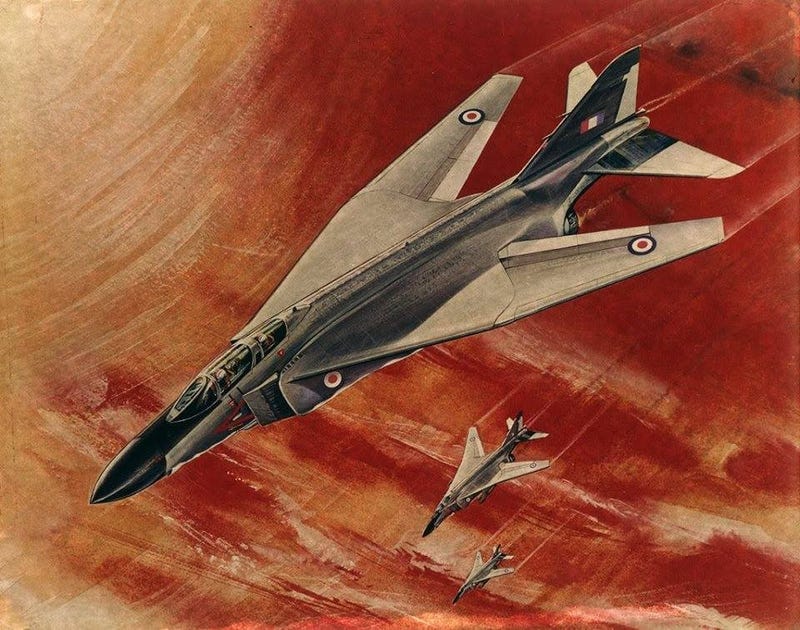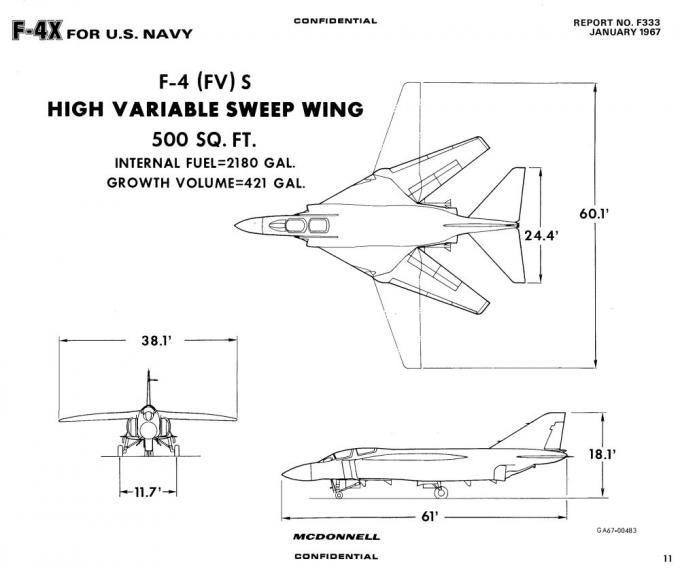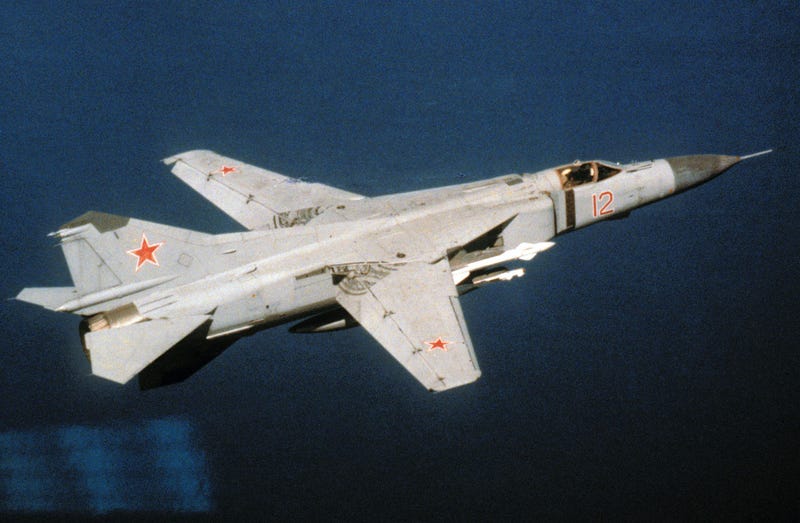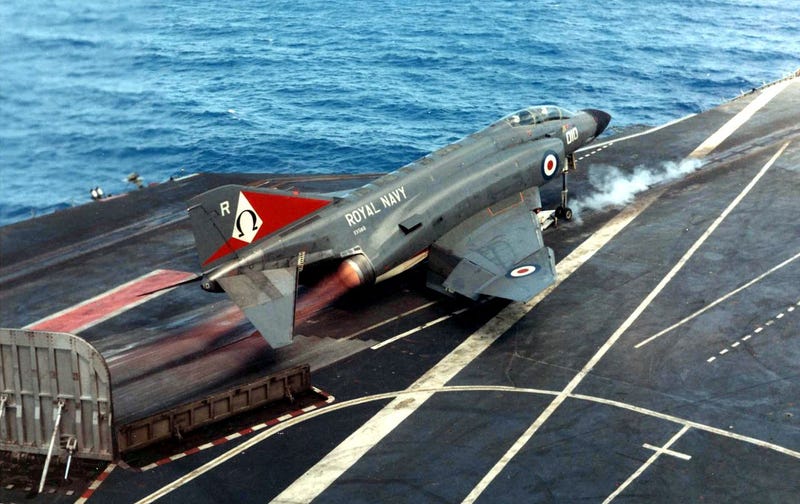
Posted on 10/18/2015 10:01:12 PM PDT by sukhoi-30mki

McDonnell Aircraft Corporation’s F-4 Phantom was quickly becoming the do-all fighter by the mid 1960s, able to lug thousands of pounds of bombs on one mission and then strictly air-to-air missiles the next. The potential for evolving the already successful Phantom became especially attractive as high-end combat aircraft programs of the ‘60s began to sputter, namely the Navy’s F-111B. Enter the F-4(FV)S variable-geometry wing Phantom concept.

The F-4(FV)S concept took the F-4 fuselage and omitted its low, bent-wing configuration. In its place was a redesigned highly-mounted swing-wing mated to large wing-root extensions. Within these extensions were the pivot points for the swing-wings. The result was a design that looked more like what would become the Soviet MiG-23 Flogger than anything else (see conceptual cutaway of the F-4(FV)S here).

Like the General Dynamics F-111 in development at the time, the F-4(FV)S’ variable geometry wing, able to sweep between 23 and 75.5 degrees, would have given the F-4 blistering high-speed performance, while also allowing for improved low-speed handling.
This configuration could have solved what was a a trade-off in the Phantom’s evolving wing design. Up until the F-4E and the F-4S, the F-4 had a “hard wing” with no leading-edge maneuvering slats to enhance its agility and slow-speed handling. This configuration was fine for pure interceptor or reconnaissance missions as it offered a wing that was optimized for high-speed flight, but for dogfighting, hard maneuvering trying to avoid enemy ground fire and surface-to-air missiles, and flying around the carrier, it was far from ideal.
By employing a variable geometry wing, the Phantom could be more aerodynamic than ever before at high speed and more responsive at low speed. This could all be had without the F-4E and F-4J’s “improved wing” that did induce a high-speed performance penalty.
In addition to a new high, swing-wing arrangement, other changes were made on F-4(FV)S concept, including improved fuel capacity, a modified tail and a new main landing gear arrangement. Even updated engines were discussed as part of the new configuration — ones with better fuel efficiency than the standard General Electric J79 axial-flow turbojet still found in Phantoms flying today.
Although the Navy did not bite at the swing-wing Phantom idea, McDonnell, which became McDonnell Douglas in 1967, kept revamping the concept. The main problem was that the Navy was looking for a Fleet Defender aircraft capable of lugging the massive AWG-9 radar and AIM-54 Phoenix missiles, something the Phantom just couldn’t be adapted to do. Instead, it would be restricted to the less capable AWG-10 radar and the latest version of the AIM-7 Sparrow, both which had a fraction of the range of the AWG-9 and Phoenix combination. The upside was it would be far less expensive than larger, more complex options.
A swing-wing fighter-interceptor solution eventually would be found for the Navy’s Fleet Defender dreams, developed under the VFX program. That aircraft being Grumman’s outgrowth production version of their 303E concept, the F-14A Tomcat. McDonnell Douglas also put forward their model 225, of which a swing-wing variant was possible although it was passed over for the Grumman design.
Even though the swing-wing Phantom may not have been right for the U.S. Navy’s needs, the Royal Navy and Royal Air Force was another possible suitor. For the Royal Navy, McDonnell proposed the F-4J(FV)S. It would feature increased fuel, a new tail design, the AWG-10 radar and AIM-7F Sparrows with simultaneous multi-engagement capability, and a variable geometry wing with a sweep of 19 degrees to 70 degrees and full-span flaps and spoilers along its trailing edge. It would also have a pair of more powerful and fuel efficient Rolls-Royce Spey turbofans.

The Royal Air Force was offered a similar aircraft under the designation F-4M(FV)S that would work for their land-based strike-fighter needs. Both designs kept high commonality with the original Phantom design for ease of transition and maintenance.
In the end, the updated swing-wing Phantom did not represent a large enough leap in capability for the UK to take the risk on procuring it. Additionally, the Anglo-French AFVG project in its early stages, and proceeding with a swing-wing Phantom would have endangered it. With the Navy also going in a more advanced direction, the variable geometry F-4 Phantom would never take flight.
Credit: DoD for photos, concept art and line drawings McDonnell/Industry
Sources: Hushkit.net, Aerospaceprojectsreview.com
F-4s are LOUD.
Looks nastier (in a good way) with fixed wings.
The F-4 Phantom: proof that if given enough thrust, you can get a brick to fly.
CC
Bump4later.
 like it wasn't heavy enough already...
like it wasn't heavy enough already...
Yup! J-79s, gotta love em!
.
I want some of whatever these guys were drinking when they dreamed this up. I swear that history will show that the first sketches of the design were made on a bar napkin.
That’s just my wild-assed guess.
Oldplayer
I suspect Kelly Johnson had more that a few of those as well, and so what? Engineers think differently, and creative juices flow at unexpected times.
As I told my boss once, my breakthrough on a design came in the morning shower as I was soaping my ***s. It became a running joke in the engineering department how to break through a sticking point.
Regardless, the airframe of the F4 was a joke for engine guys and we ordnance types that had to drop the aft Sparrow launch racks every time they needed to change an engine.
After a bunch of combat flight hours, the airframe was so torqued we could not get the damn bolts lined up to re-install the racks. Hated that job, was never so glad to get out of fixed wing squadrons...............
If such a swing wing thing was considered, I sure hope a new aft airframe was part of the deal.
Iconic silhouette of Vietnam era air craft. Especially from the tail looking forward. A classic!
I worked on the F4C, D, &E’s never saw a B.. They used to come back with half the tail shot off.. Good Plane!!
The F-4 always looked like it was meant for killing... awesome aircraft.
It would have been a totally new aircraft, save for the nose section. I’m betting that had the concept progressed that the Navy would have ditched the J-79 engine in favor of the TF-30.
You don’t take a low-wing jet and put a high-wing, variable sweep to it without re-engineering the entire wing box & spars.
McDonnel-Douglas was engaging in the same type of leveraging activity that Chance-Vought did with the Crusader III, and later Boeing witht he F-15SE Silent Eagle. Not suggesting that this is a ‘bad thing’ but the Swing-Phantom probably had a lower parts commonality that the other 2.
F4-11? The phantom was the aircraft model of my childhood, with a huge scale one from Wright Patterson afb/ AF Museum flying the ceiling of my room. Beautiful, bada$$ warbird.
When the Royal Navy was looking to upgrade it’s carrier borne interceptor from the Sea Vixen, the F-4 was the only game in town.
Crossdecking ops with USN F-4s tho had shown that the Phantom was barely marginal in flying from the RNs smaller carriers. Ark Royal was, in available deck space, slightly bigger than an Essex, and considerably smaller than a Midway.
Variable geometry was one way of aleviating this. But the Brits were already shelling out major cash to put the home-built Spey engine into the Phantom. So they went for an easier and quicker alternative: add a second oleo to the nose gear to lift the nose further/increase angle of attack on launch (preserving the ability to launch with more than a basic air to air fit) and accept that getting down to recovery weight would mean jettisoning any air to ground ordinance carried before trapping.
Sometimes I never saw the Phantoms. But I always heard they’re bombs...
Lead Sled! One of the best looking aircraft ever built.
The F-4 Phantom: proof that if given enough thrust, you can get a brick to fly.
*******************************
I served on a carrier in the early ‘60s; catapults division. I can attest that the F-4H aircraft had VERY powerful and loud engines. .....Too bad that they didn’t have cannons or machine guns. Having only bombs or missiles led to many being shot down over VN later. ....The sweep wing version may have allowed some to evade enemy aircraft more easily.
Disclaimer: Opinions posted on Free Republic are those of the individual posters and do not necessarily represent the opinion of Free Republic or its management. All materials posted herein are protected by copyright law and the exemption for fair use of copyrighted works.